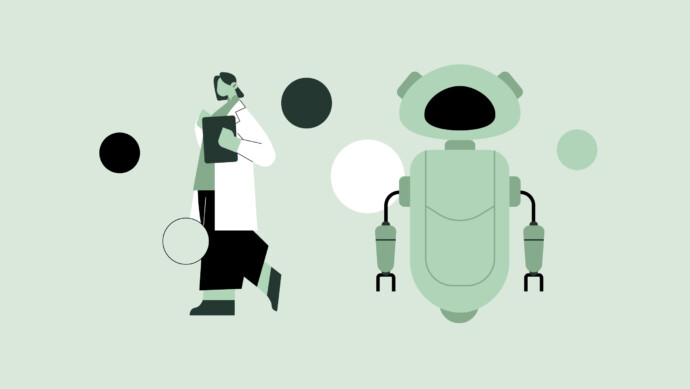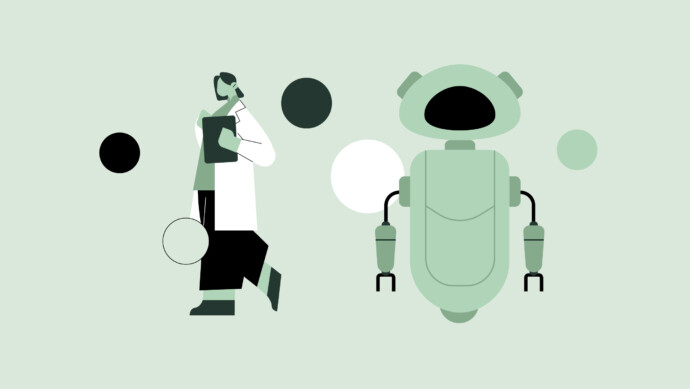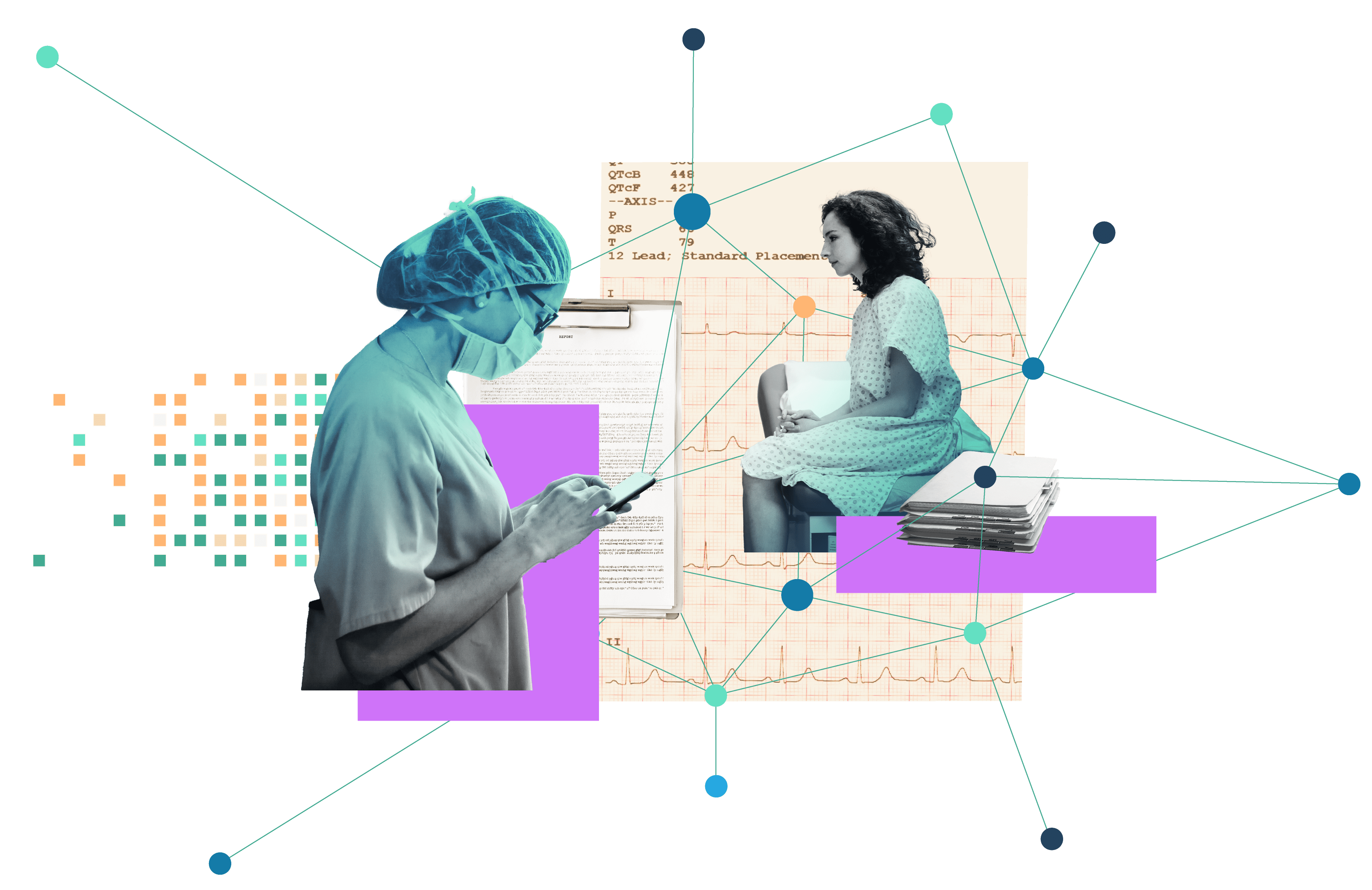As artificial intelligence advances, a burning question lingers: Will AI replace doctors? This post explores the evolving role of AI in healthcare, from automating mundane tasks to enhancing diagnostic accuracy. While some fear job loss, we’ll unpack how AI is seen more as a partner to doctors, allowing them to focus on what they do best—caring for patients.
Join us as we reveal the boundaries of AI's capabilities in medicine. We’ll discuss what tasks AI is taking over, what remains uniquely human, and how doctors can adapt to thrive in an AI-enhanced world. By the end, you’ll understand the future landscape of healthcare and the invaluable role of doctors within it.
Explore this post with:
Table of contents
White Coats & AI: Doctors' Verdict on the Future
Doctors are certainly buzzing about AI, and their feelings are a real mixed bag. While many show enthusiasm for AI's potential to transform care, a noticeable portion-up to 21% in one Sermo poll-express fear or opposition due to privacy and trust concerns. Indeed, half of specialists in one study feared AI could lead to unemployment, highlighting genuine worries about their future roles. However, most agree AI will augment them, not replace them.

Credits: Sermo.com
The prevailing view is that AI acts as "augmented intelligence," designed to support professionals, not sideline them, as the AMA highlights. Experts like Dr. Baligh R. Yehia emphasize that empathy and personal care remain uniquely human, something AI simply cannot replicate. Instead, AI can handle administrative burdens and improve diagnostics, freeing doctors to focus on complex cases and patient interaction. This shift is already in motion, with nearly two-thirds of physicians using AI tools now, underscoring that "physicians that understand how to use AI will replace those that don't," according to Margaret Lozovatsky, MD.
Tasks AI is Automating for Doctors
AI is rapidly changing the landscape of medical practice by automating various routine tasks that were traditionally performed by doctors. One prominent area is clinical documentation, where AI tools like Chat GPT can streamline the creation and management of clinical notes, significantly reducing the time doctors spend on paperwork. Furthermore, AI systems are stepping into roles such as data entry and report generation, ensuring that patient data is more efficiently managed and reported.

Credits: Harvard Medical School
Beyond administrative duties, AI shows promise in enhancing diagnostic accuracy. Technologies developed by Google and DeepMind can analyze medical images with precision, often matching or surpassing human diagnostic capabilities in radiology and pathology. However, it's important to note that while AI can handle data-driven tasks, the nuanced judgment and empathy of a doctor remain irreplaceable, ensuring that the human touch in patient care stays paramount.
What Parts of Doctor Jobs AI Cannot Replace
Doctors uniquely provide a caring touch and build trust, which AI cannot replicate. This human connection, encompassing empathy and emotional support, remains a core part of patient care, particularly in areas like palliative care and pediatrics, as highlighted by the AMA and KevinMD. Google DeepMind CEO Demis Hassabis also states that roles relying on human empathy will continue to exist in an AI-driven world.

Credits: AMA
Beyond processing data, physicians apply nuanced clinical judgment and intuition to complex diagnoses, understanding a patient's unique emotional and social circumstances. The BMJ notes doctors address ethical dilemmas and make decisions focused on patient well-being, abilities currently outside AI's scope. Generative AI, while passing exams, does not possess true understanding and can introduce bias, making human oversight necessary for accuracy and fairness, according to the AMA.
Career Evolution for Doctors in the AI Era
The integration of AI in healthcare is reshaping the role of doctors. According to a Nature article, doctors are transitioning towards roles as physician-algorithm specialists. They will bridge the gap between complex AI systems and clinical practice, similar to how clinical pharmacists guide medication use. This shift encourages doctors to focus on understanding and interpreting AI tools rather than interacting with them directly.

Credits: Elsevier
To adapt, doctors should invest in learning AI systems, data science, and their applications in clinical settings. As highlighted in a Springer article, acquiring skills in data analysis, machine learning, and the ethical implications of AI use will be important. This approach will enable doctors to enhance their patient care through technology, ensuring they remain at the forefront of medical innovation.
Doctor hiring trends in the US
The healthcare sector in the US is witnessing a noticeable expansion, with a significant portion of job growth attributed to doctors. According to LinkedIn, 55,000 new healthcare jobs were added in July 2025, indicating a strong demand for medical professionals. However, the industry faces challenges like recruitment difficulties, especially for roles requiring specialized skills.
The demand for doctors is further highlighted by projections from the Association of American Medical Colleges (AAMC), which anticipate a shortage of 13,500 to 86,000 physicians by 2036. This shortfall is compounded by an aging population and the increasing prevalence of chronic diseases. Additionally, the rise of telemedicine and alternative care models is creating diverse opportunities for doctors beyond traditional roles.
Healthcare roles are among the few sectors seeing robust growth despite a general slowdown in the job market. The Indeed Hiring Lab reports that healthcare job postings are significantly elevated above pre-pandemic levels, highlighting the ongoing demand for doctors and healthcare professionals.
Is Doctor AI safe?
The consensus among healthcare professionals is that doctors are generally safe from being replaced by AI. While AI significantly enhances capabilities in areas like diagnostics and administrative tasks, the human touch—empathy, understanding, and nuanced decision-making—remains irreplaceable. A recent survey noted that 66% of physicians are already utilizing AI tools in their practices (AMA), emphasizing a trend towards integration rather than replacement.

Credits: Sermo.com
Although some doctors express concerns over job security due to AI advancements, most studies indicate that AI will serve as a supportive tool, not a competitor. For instance, 41% of physicians leverage AI for basic tasks, yet many express a desire for more training to better adapt (Sermo). This suggests a shift in roles where physicians evolve into specialists who interpret and apply AI insights, keeping the patient-doctor relationship at the core of healthcare.
Recruiter's Guide to Hiring Doctors: What to Look For
In today's healthcare hiring landscape, recruiters must focus on a blend of traditional skills and new competencies for doctors. Adaptability to technology and understanding of AI tools are paramount, as these will enhance clinical decision-making and patient care AI in Healthcare Recruiting. Strong communication skills and problem-solving abilities remain vital as AI tools become a standard part of the healthcare environment.

Credits: CHG Healthcare
To screen candidates effectively, using Adaface's Prompt Engineering Test can help assess a candidate's ability to interact with AI tools. The Generative AI Test evaluates understanding and application of AI in clinical settings. These assessments ensure that the doctors you hire are ready to integrate AI into their practice seamlessly. Additionally, consider specific doctor tests from Adaface to tailor your assessments further.
Prompt Engineering Test
Generative AI Test
Doctor-Specific Test
Embracing the AI Era: A Brighter Future for Doctors
Forget any worries about AI taking over; it's here to empower. For current doctors, AI acts as an incredible co-pilot, handling things like clinical documentation and data entry that often steal valuable time. This allows for deeper, more meaningful patient interactions, reducing burnout and increasing job satisfaction. Employers, too, will benefit from a workforce that can focus on complex care and human connection, enhancing overall service quality.

Credits: Harvard Gazette
The future for doctors is not just secure, it's brighter and more interesting. AI is transforming roles, allowing doctors to become physician-algorithm specialists who interpret advanced insights, leading to more accurate diagnoses and personalized care. This human-AI collaboration ensures superior patient outcomes and a more engaging profession for medical staff. Recruiters should seek candidates ready to embrace this exciting, forward-thinking medical landscape.

40 min skill tests.
No trick questions.
Accurate shortlisting.
We make it easy for you to find the best candidates in your pipeline with a 40 min skills test.
Try for freeRelated posts



